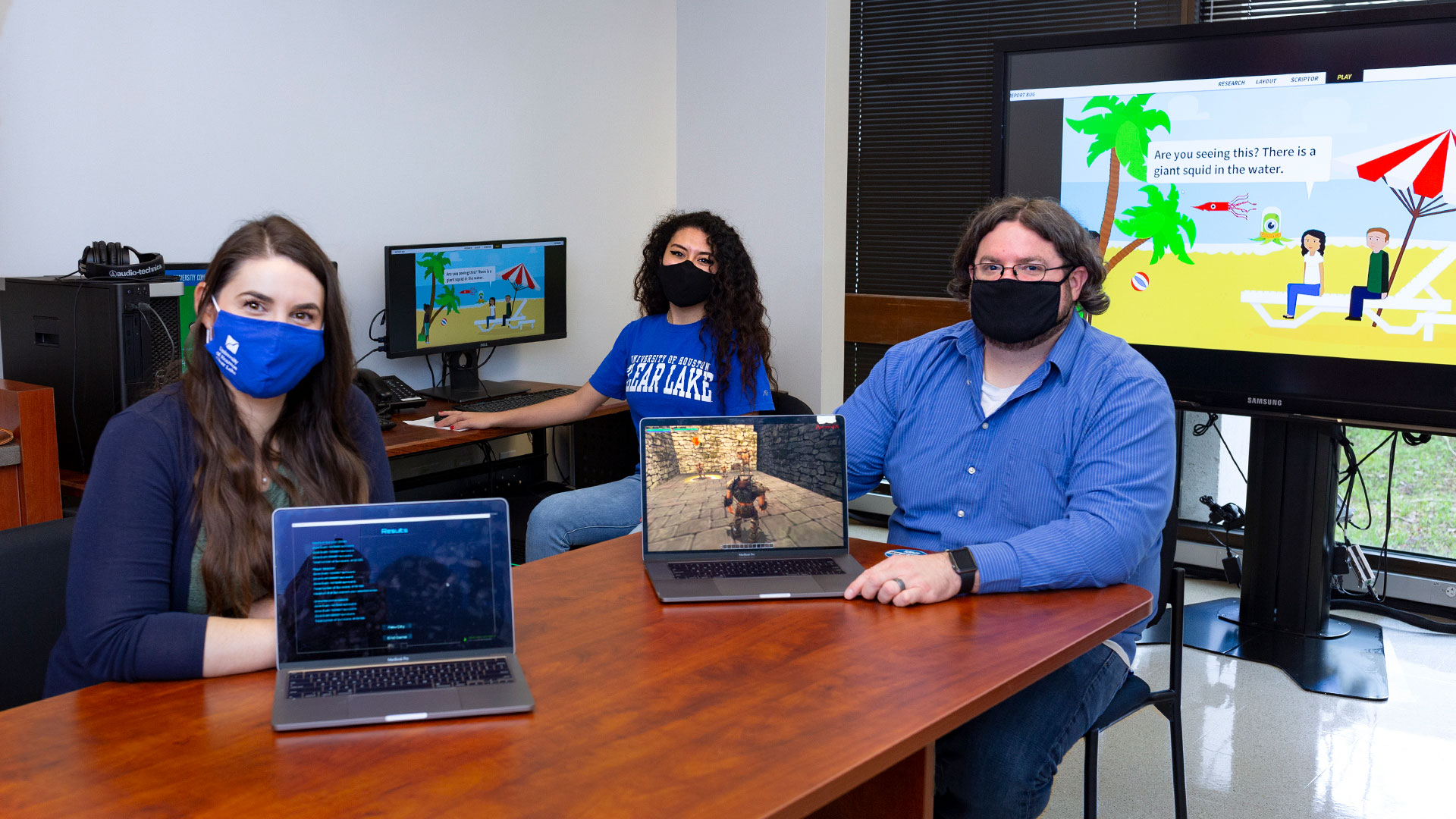- Future Students
- How to Apply
- Visit UHCL
- Admitted Students
- Tuition, Costs and Aid
- Degrees and Programs
- Contact Admissions
- Current Students
- Class Schedule
- Academic Calendar
- Advising
- Events
- Library
- Academic Resources and Support
- Student Services and Resources
- Alumni
- Lifetime Membership
- Alumni Events
- Update Your information
- Awards and Recognitions
- Give to UHCL
New degree a game changer for video, tech students at UHCL
May 19, 2021 | UHCL Staff

While there's widespread recognition of global health failures in terms of infectious
disease outbreaks, there's not much disagreement about how policy makers can become
more prepared and responsive. The use of serious games and simulations are becoming
a critical tool to promote learning and innovation, with applications that go far
beyond sustaining learning during a pandemic lockdown.
To answer the call for qualified people who can create effective learning structures where students aren't physically present in a classroom, University of Houston-Clear Lake is offering a Bachelor of Arts in Serious Games and Simulation, beginning in fall 2021.
"Serious games have become a critical training tool in so many work environments," said Professor of Psychology Rick Short, who spearheaded the committee to create the new degree program — the university's first interdisciplinary plan spanning coursework from all four colleges (Business, Education, Human Sciences and Humanities, and Science and Engineering) in the university.
"We needed to add this degree to our list of options because we are an institution that is focused on teaching and learning," said Short. "Video games and simulations have become ubiquitous in world culture, and using a tool that has already pervaded world society to promote learning seems to be a self-evident goal that we need to explore."
Short said there are more and more calls for simulations and games to support learning. "This is a developing area, and it's not just our realization," he said. "It's overtaking American education. The job demand is at the front end of the curve, and it's burgeoning. That's our prediction, and it's the Texas Workforce Commission's prediction as well."
Assistant Professor of Psychology and Serious Games and Simulation Program Director Steven Sutherland said that with the pandemic, the world changed so much in the last year, there's a gap in the workplace.
"We are now dealing with many more work-from-home models. We've seen a big push in the direction of simulated training programs at all levels, so serious games and simulations have picked up steam in terms of finding ways to educate," he said. "The old model is transitioning away, and the way we educate now has shifted to needing more hands-on experience, which is hard to do in a classroom."
Traditional "trainings" where people sit together in a conference room and talk is no longer a viable option. "If you have a particular skill that needs to be mastered when there are severe consequences for mistakes, like in the medical field, how do you provide an experience where it's safe to fail?" Sutherland said.
"This is the kind of environment in which SGS has become a really important training tool," he said. "We still need to be educating students in a meaningful way, with lab-based experiences. Now we're talking about simulations in virtual reality or augmented reality. The key is bringing experiences into the classroom and making them real."
With the onset of the COVID-19 pandemic, Sutherland continued, the need for alternative education models became more acute. "Employers don't need employees in offices, so as work shifts away from being present in an office, they're looking for ways to fill that gap," he said. "We need people who can create that training software, either outsourced or built in house. That creates the potential for new positions in companies to solve that, or for consulting work for multiple types of companies. As we see how the world is changing, people who enter the workforce with this degree can fill that gap."
Sutherland said this degree is unique to others because of its interdisciplinary nature. "Collaboration is important, but in serious games and simulation, it's more than important — it's a necessity," he said. "The workplace will change even more. Some people will become consultants, and in order to promote that, students will need to understand the business side of this, which could otherwise be lost."
For people building games, he continued, "acquiring coding skills in computer science and engineering makes sense. And serious games are meant to train people and expect an educational outcome, so that's why classes in the College of Education make sense. Games will miss the point if students aren't learning the concepts."
From a human sciences and humanities standpoint, Sutherland said classes in psychology, art and human factors psychology would blend in well in the SGS coursework. "Art courses, digital media as it relates to art, and communication courses make students marketable and desirable hires," he said.
"It's a well-rounded degree plan," he said. "Students receive a good foundation in all areas, and can be trained up and get sharper skills in any of these categories. Focusing on SGS creates a specialization, but with these additional skills, students can go in different directions."
For more information about the Bachelor of Arts in Serious Games and Simulations, go online.






